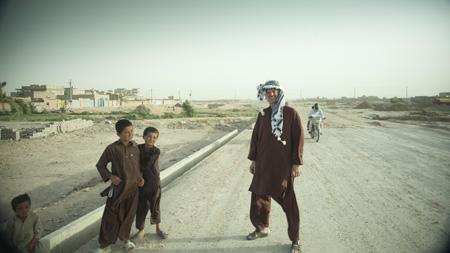Henrik Bohn Ipsen was a cameraman even before attending the National Film School of Denmark. In the early '90s, on a trip to South America, he assisted on a film about the Arhuaco Indians. The crew was returning to the tribe six years after making a film about them. Lugging the projection equipment, screen and batteries up a mountain, they show the Indians the film and eagerly await their reaction.
The next day, the Indians line up, very formally, and announce that, Sure, the film represented their cause quite well. But it wasn't about them at all, it was about the film crew!
"They didn't even recognise themselves," Ipsen says. "That experience really etched itself into my memory – and it affected my way of being a DP."
Ipsen has often been hired for jobs abroad that require something special – what is it he's got?
"I'm probably quite good at meeting people," he says. "When you meet a stranger, they can tell from your eyes whether you are interested in them as human beings or not, whether it's an Afghan Muslim or an Argentine football fan. You can't measure people by your own background and norms."
As crucial to his approach, he cites his childhood and youth in Ishøj, a Copenhagen suburb where many immigrants live.
"There will always be barriers, of course, when you travel places where people are less privileged. You're rich, you have a camera, you can travel the world. But I like to think that people can tell from my attitude that I grew up in a mixed social and cultural environment."
For Ipsen it's about looking with fresh eyes, being able to cope with the strange state of uncertainty and always looking for that which can't be expressed in words. It's about reaching deeper layers and not resorting to obvious solutions. "Case in point, I refuse to photograph anyone in Africa carrying water jugs on their head," he says with a grin.
Ipsen always carries the collected verse of the Danish poet Henrik Nordbrandt when he is travelling. Perhaps because he shares the writer's aspiration. "A poet puts two words together and something new happens, something metaphysical. He formulates a perception that's universal," the DP says.
In addition to his Nordbrandt book, Ipsen never travels without his Navajo silver clip. "It doesn't feel right if I don't have it in my right side pocket," he says. "My lens cleaning cloth has to go in my left side pocket, plus there are lens filters I can't do without. I'm generally pretty autistic about where my things should be, and I have to help pack the car. After all of that, then I feel safe."
Another comforting factor is his years of travel experience. "I have evolved a whole sensory apparatus to screen drivers and local contacts. I can usually tell the size of the problem by the cut of someone's suit," he says.
Once the project is on the road, Ipsen possesses one of the most important qualities in a DP: stamina.
"When we have been driving and driving and shooting and shooting and plugging along all day and we're almost at the verge of giving up – then everything falls into place. People stand in the right light, an atmosphere emerges – these are the moments you're looking or. And to seize them, you have to stay ‘on' for a very long time."
"So they can tease me about running on Duracell all they want," he smiles. "I don't quit."
